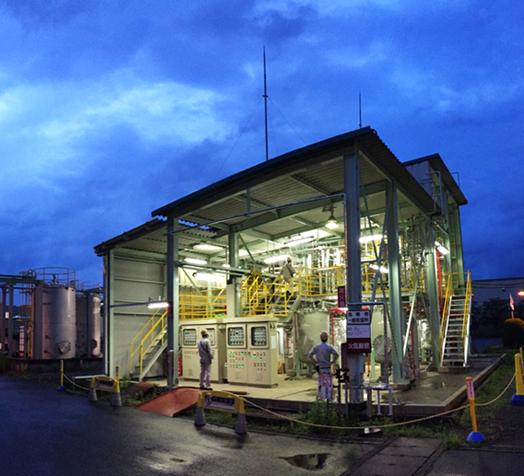Shifting away from petroleum-based synthetic materials

Credit: Hitachi Zosen Corporation
JST has announced that the development subject “Manufacturing Technology for New Plant-Origin Functional Materials”, in the Newly extended Technology transfer Program (NexTEP) was a success. This development subject was carried out by consignment to Hitachi Zosen Corporation towards commercial application based on the research findings of Professor Takeshi Bamba of the Research Center for Transomics Medicine, Medical Institute of Bioregulation, Kyushu University (Associate Professor, Osaka University at the time) and others.
Polyisoprene is an important substance for the chemical industry as a raw material for rubber products and other highly elastomeric resins. Trans-polyisoprene (TPI) in particular has been mostly manufactured from naphtha and other petroleum-based raw materials and used as cable coverings and sports and medical equipment components. The objective of this project was to develop a manufacturing facility for high-purity Eucommia elastomer, a high-performance TPI extracted from the seed peels of the Eucommia ulmoides, and aimed at achieving early commercial production. The challenge was to reduce production costs relative to the TPI derived from petroleum.
Mindful of the properties of Eucommia elastomer®, Hitachi Zosen Corporation conducted market research over a wide range of uses while going forward with the development of refining technology focused on reducing production costs. Adopting a threshing technology that removes the useless cotyledons from the Eucommia ulmoides seeds enabled them to establish a technology with which it is easy to produce high-purity products with controllable molecular weight distribution. Ultimately, they succeeded in developing a refining facility that reduces manufacturing cost of the Eucommia elastomer® to approximately one-eighth of the cost at the beginning of the project and producing 10 tons of Eucommia elastomer® per year highly efficiently with an extraction purity of 99.8% (Fig.1).
Product development is under way in cosmetics and other high-value-added markets, taking advantage of the features of Eucommia elastomer® as a sustainable new plant-based material. Going forward, it is hoped that the program will contribute to new industries while protecting the global environment as new areas open up for its application.
###
Media Contact
Tomomitsu Yamamoto
[email protected]
Original Source
https:/




